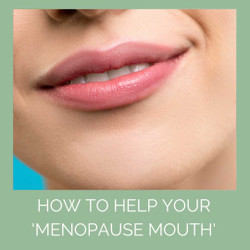Perimenopause (the time before your periods stop) and menopause (when your periods have stopped for longer than two years) come with a host of symptoms, including issues with your mouth.
Menopause can hugely affect your oral health, internally and externally, so this guide should help you to:
a. Understand what’s happening and why
b. Find natural ways to support yourself, even if you cannot or do not wish to use hormonal therapies to help
What Menopause Symptoms Affect the Mouth & Lips?
Dry Mouth:
When we think of menopause symptoms, we usually think of brain fog and hot flushes, both of which Davina McCall talks about brilliantly in her latest documentary, Sex, Mind and The Menopause. But the list is much longer, and a dry mouth is a very common one.
It happens when hormonal shifts mean we create less saliva. Saliva is there to protect your mouth from bacteria. If there’s less of it about, you may find yourself struggling with receding gums, cavities, and a higher likelihood of infection.
You may also experience changes in how food tastes and issues with getting words out, as dry mouth can make speaking very uncomfortable.
What causes dry mouth during the menopause?
Oestrogen encourages the production of saliva, along with many other bodily fluids. As the levels of oestrogen fall, so does the production of saliva.
1 in 3 menopausal women also report experiencing symptoms of anxiety, which can also trigger dry mouth.
It usually begins once perimenopause is quite advanced and becomes especially problematic at the stage of menopause. In some severe cases it can lead to something called ‘burning mouth’, which causes pain and tingling in the mouth and lips.
Cracked, Sore Lips:
The lips also experience symptoms of dryness and soreness during the menopause. They’re delicate and any shift in hydration will affect them.
Hormones can also impact the moisture balance, causing them to lose elasticity and crack.
Why your lips crack during the menopause:
Common conditions that many women experience during menopause can lead to lip cracking.
Medications for a variety of health conditions can lead to thinning skin and dry mouth. Vitamin and mineral deficiencies can worsen them. Licking the lips as a result of dry mouth can also impact the problem.
You’re more likely to develop intolerances at this age, so may get rashes and itching on the lips.
How to Manage Your Menopausal Mouth the Natural Way

Hydration:
Hydration is critical: Especially during warm weather, or working out, make sure you get a minimum of 8 glasses of fluid, preferably water, a day.
Protect & Nourish:
Get a great organic lip balm: One that is rich in bee friendly beeswax will help prevent you licking them and making them sore.
If you find one that also has calendula, it may help with soothing the burn. ALWAYS wear it outdoors and apply at least twice a day to support your lip health.
If you can't stop licking or biting your lips during workouts, give them a bit of love by coating them with a thick, beeswax-based lip balm that prevents you from directly licking the skin.
Other ingredients that can help include shea butter, or coconut oil which both add a layer of protection to the lips.
Speak to your doctor:
About support with your hormone balance. Even if HRT isn’t right for you, there may be alternatives that can help.
De-Stress:
Learn to manage your anxiety: It’s not easy but managing your anxiety levels can help with the symptoms of dry mouth.
Using a relaxing essential oil blend for massage, or for mindful deep breathing can be helpful. CBT is an excellent therapy to help with intrusive thoughts and consider your work/life balance.

